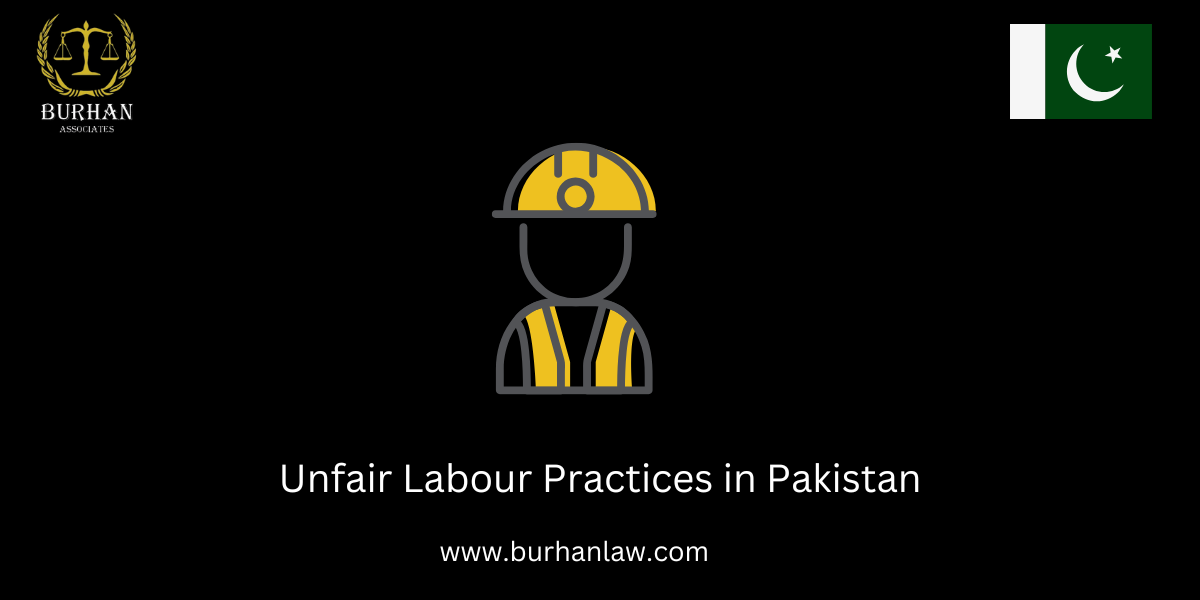Complaint of Unfair Labour Practice:
Unfair labour practices (ULPs) encompass any conduct by employers, unions, or workers that violates labor laws and infringes upon the rights and protections afforded to employees. These practices are not only detrimental to workers but also undermine fair competition, workplace harmony, and organizational growth. Addressing complaints of unfair labour practices is, therefore, a crucial aspect of labor law enforcement, ensuring justice for aggrieved parties and fostering a balanced industrial environment.
This article, tailored for individuals, businesses, and unions alike, provides a detailed guide to understanding, identifying, and addressing complaints of unfair labour practices as per Burhan Law.
What Constitutes Unfair Labour Practices?
Unfair labour practices are actions that contravene established labor laws, agreements, or the fundamental rights of workers. Common examples include:
-
Employer Violations:
- Discriminating against employees based on race, gender, religion, or other protected characteristics.
- Retaliating against workers for union activities or whistleblowing.
- Failing to adhere to collective bargaining agreements.
- Interfering with the formation or administration of labor unions.
-
Union Misconduct:
- Coercing employees into joining or maintaining union membership.
- Using unlawful means to enforce demands.
- Failing to represent union members fairly in disputes.
-
Employee Misconduct:
- Engaging in strikes or protests that violate agreed-upon labor contracts.
- Breaching the terms of employment through willful misconduct.
These practices disrupt the workplace equilibrium and infringe on the rights and responsibilities of the involved parties.
Legal Framework Governing Unfair Labour Practices
The laws addressing unfair labour practices vary by jurisdiction but typically aim to uphold workers’ rights, ensure fair treatment, and regulate employer-employee relationships. Key components of these laws include:
- Labour Relations Acts: Establishes mechanisms for dispute resolution and outlines prohibited practices.
- Employment Standards Legislation: Sets minimum standards for wages, working conditions, and employment rights.
- Collective Bargaining Laws: Regulates the negotiation process between employers and unions.
- Anti-Discrimination Laws: Protects employees from bias and ensures equality in the workplace.
Understanding these legal provisions is crucial for navigating complaints effectively and ensuring compliance.
Filing a Complaint of Unfair Labour Practice
If you believe you have been subjected to an unfair labour practice, taking timely and appropriate action is essential. Follow these steps to ensure your complaint is handled effectively:
Identify the Issue
Clearly outline the incident, including details of what occurred, who was involved, and how it contravenes labor laws or agreements. Documenting dates, times, and other relevant information is essential for building a strong case.
Seek Internal Resolution
Before escalating the matter to external authorities, attempt to resolve the issue internally. This may involve:
- Reporting the incident to your HR department or management.
- Engaging in dialogue with union representatives if applicable.
Consult a Legal Expert
Seeking legal counsel from experienced professionals, such as Burhan Law, can provide clarity and direction. Lawyers specializing in labor law can:
- Assess the validity of your complaint.
- Advise on the best course of action.
- Represent you in negotiations or hearings.
File a Formal Complaint
If internal resolution fails, submit a formal complaint to the relevant labor board or authority. This typically involves:
- Completing a complaint form.
- Submitting supporting evidence, such as documents, emails, or witness statements.
- Adhering to prescribed timelines and procedures.
Investigating and Resolving Complaints
Upon receiving a complaint, labor authorities or courts initiate an investigation to determine its validity. The process generally includes:
- Preliminary Assessment: Reviewing the complaint to ensure it meets procedural requirements and falls within the jurisdiction.
- Mediation or Conciliation: Encouraging the parties to resolve the dispute through dialogue and compromise.
- Formal Hearing: If mediation fails, a formal hearing may be conducted where evidence is presented, and witnesses testify.
- Decision and Remedies: Based on findings, the authority issues a decision, which may include remedies such as:
- Compensation for the aggrieved party.
- Reinstatement of wrongfully terminated employees.
- Penalties for violators.
Preventing Unfair Labour Practices
Preventing ULPs requires a proactive approach from employers, unions, and employees. Here are some best practices:
For Employers:
- Implement Clear Policies: Establish and communicate workplace policies that align with labor laws.
- Train Managers and Supervisors: Equip them with knowledge on legal compliance and respectful workplace practices.
- Foster Open Communication: Encourage feedback and address grievances promptly to prevent escalation.
For Unions:
- Promote Ethical Conduct: Ensure union activities adhere to legal and ethical standards.
- Educate Members: Provide training on workers’ rights and responsibilities.
- Maintain Transparency: Uphold fair representation and accountability in all dealings.
For Employees:
- Know Your Rights: Familiarize yourself with labor laws and your employment agreement.
- Document Incidents: Maintain records of any unfair practices for evidence.
- Engage Constructively: Address issues through proper channels rather than resorting to unlawful actions.
Why Choose Burhan Law?
At Burhan Law, we specialize in labor law and are committed to protecting the rights of employees and employers alike. Our team provides:
- Expert Legal Advice: Tailored solutions for complex labor disputes.
- Comprehensive Representation: Support in negotiations, mediations, and court proceedings.
- Proactive Support: Guidance on preventing future ULPs through compliance programs and policy development.
With a proven track record of success, Burhan Law is your trusted partner in ensuring workplace justice and harmony.
Conclusion
Unfair labour practices erode trust, disrupt productivity, and violate the fundamental rights of workers. Addressing complaints effectively requires a thorough understanding of labor laws, a commitment to fair practices, and the guidance of experienced legal professionals. Whether you are an employer, employee, or union member, taking proactive measures to prevent and resolve ULPs is essential for fostering a just and equitable workplace.
For expert assistance with unfair labour practices, contact Burhan Law today. Let us help you navigate the complexities of labor law and secure the justice you deserve.
For More Information Visit Us : Burhan Law












